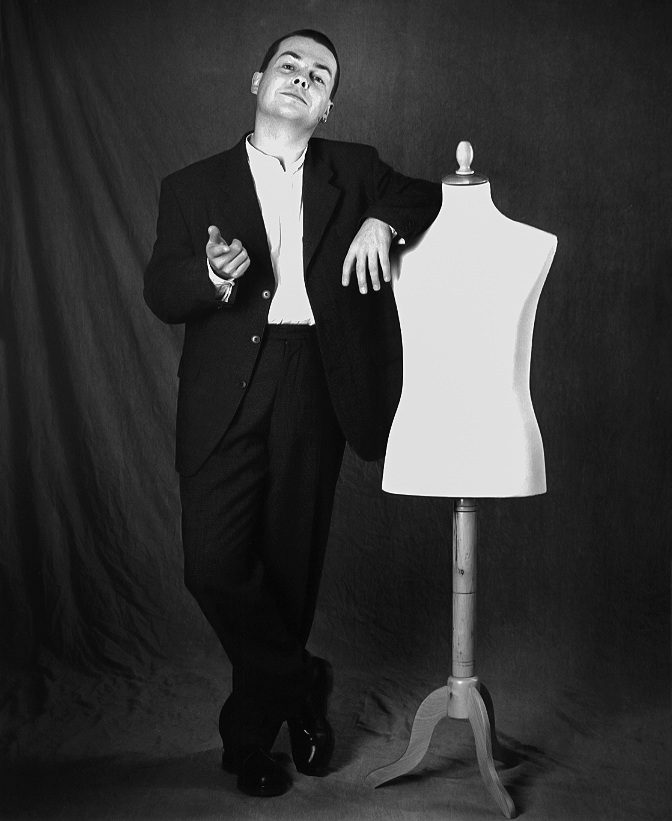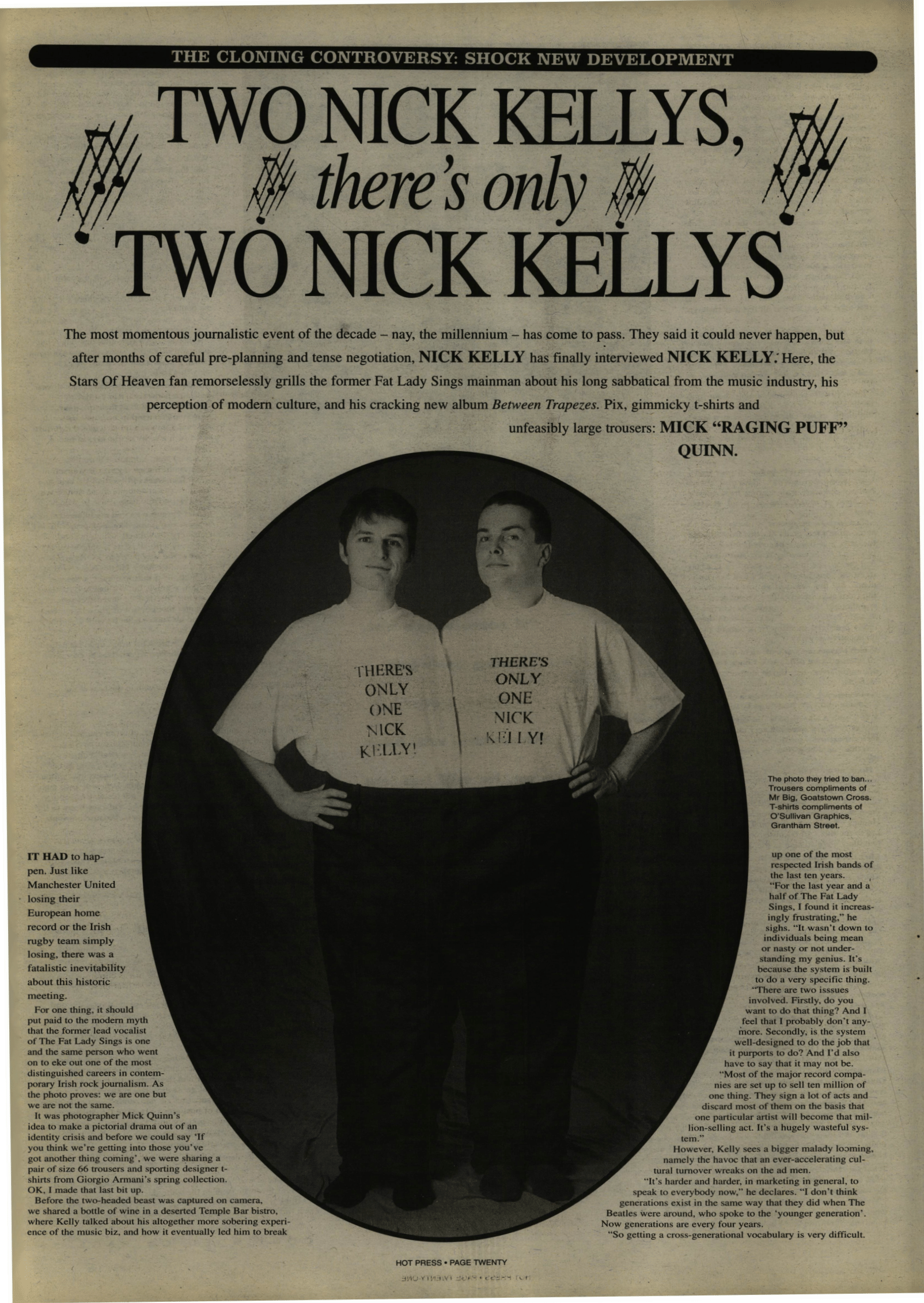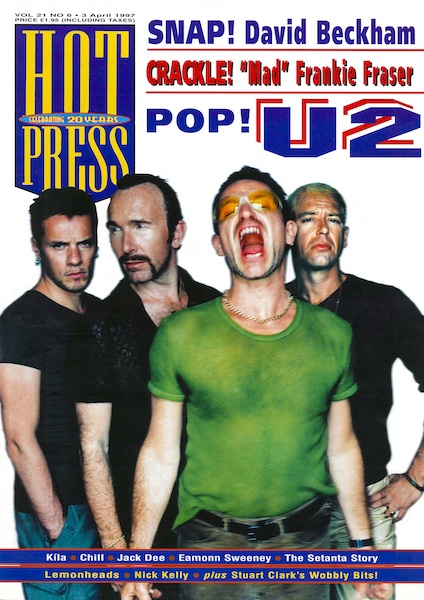- Music
- 03 Apr 97
Two Nick Kellys, There's Only Two Nick Kellys

The most momentous journalistic event of the decade – nay, the millennium – has come to pass. They said it could never happen, but after months of careful pre-planning and tense negotiation, Nick Kelly has finally interviewed NICK KELLY. Here, the Stars Of Heaven fan remorselessly grills the former Fat Lady Sings main-man about his long sabbatical from the music industry, his perception of modern culture, and his cracking new album Between Trapezes. Pix, gimmicky t-shirts and unfeasibly large trousers: Mick QuInn.
It had to happen. Just like Manchester United losing their European home record or the Irish rugby team simply losing, there was a fatalistic inevitability about this historic meeting.
For one thing, it should put paid to the modern myth that the former lead vocalist of The Fat Lady Sings is one and the same person who went on to eke out one of the most distinguished careers in contemporary Irish rock journalism. As the photo proves: we are one but we are not the same.
It was photographer Mick Quinn's idea to make a pictorial drama out of an identity crisis and before we could say 'If you think we re getting into those you've got another thing coming, we were sharing a pair of size 66 trousers and sporting designer t-shirts from Giorgio Armani's spring collection. OK, I made that last bit up.
Before the two-headed beast was captured on camera, we shared a bottle of wine in a deserted Temple Bar bistro, where Kelly talked about his altogether more sobering experience of the music biz, and how it eventually led him to break up one of the most respected Irish bands of the last ten years.

"For the last year and a half of The Fat Lady Sings, I found it increasingly frustrating," he sighs. "It wasn't down to individuals being mean or nasty or not understanding my genius. It s because the system is built to do a very specific thing.
"There are two issues involved. Firstly, do you want to do that thing? And I feel that I probably don't anymore. Secondly, is the system well-designed to do the job that it purports to do?' And I also have to say that it may not be.
"Most of the major record companies are set up to sell ten million of one thing. They sign a lot of acts and discard most of them on the basis that one particular artist will become that million-selling act. It s a hugely wasteful system."
However, Kelly sees a bigger malady looming, namely the havoc that an ever-accelerating cultural turnover wreaks on the ad men.
"It's harder and harder, in marketing in general, to speak to everybody now," he declares. "I don't think generations exist in the same way that they did when The Beatles were around, who spoke to the younger generation. Now generations are every four years.
"So getting a cross-generational vocabulary is very difficult. Because people who are respectively four, eight or twelve years younger than me have each had a completely different set of cultural influences. There s so much information out there that eventually the portcullis comes down.
"Because rock n roll coincided with the birth of the teenager as an economic force, record companies have been immensely complacent in assuming that teenagers will only want to express themselves through rock n roll. I don't think that the music industry has really thought through the possibility that something that has existed as a cash-cow for 40 years might not exist in another ten."
I WANT TO FEEL MORE
The tendency for Kelly's answers to shift from details of his own personal experiences to a more general overview of the way things work is indicative of a man whose intellectual amp, unlike most rock singers, is turned right up to 11.
"We live in times where it's harder and harder to work out what s going on at all," he says. "I read two newspapers every day and I still don't know what's going on in Burkina Faso or Rwanda and it's harder and harder to cope, to analyse and dissect and to put things in a context.
"Internally, as well, it's becoming more and more difficult to know how we feel. And the great thing about a really good painting or a line in a song is that it's a moment where you suddenly get a picture of how the world is. There's never been a time when I have appreciated that more than now.
"The one great thing about art, if it s properly done, is that even the artist doesn't know what he's put in there. It's the one piece of thought that can't be pre-digested for you."
Kelly's CV is of such a high calibre that he doesn't have to rely on his new album, Between Trapezes, to commercially outjump the Spice Girls in order to be assured of his next hot dinner. A qualified solicitor, he has worked as a lecturer, a journalist for a computer magazine, Commodore User (for which he reviewed video games), and an advertising copy-writer (his present gig).
Signalling his re-emergence onto the Irish rock scene after an absence of four years, Kelly's debut as a solo artist is evidently a labour of love. Part-financed by his loyal legion of fans who sent their cash without fear or favour in return for a credit on the album sleeve, Between Trapezes is an object lesson in the DIY indie ethic. The sole artist on Self-Possessed Records, the resourceful Dubliner has cut out the meddling middle-men and even taken the trouble to write to all 800 souls on his mailing list, who can reply via Kelly's e-mail address. A web-site is in the pipeline too.
"My expectations are quite different now than they were in the past," he avers. "The idea of doing it all again in the same way seems so emotionally and financially destructive; it would sap my energy. I think it's very important that everybody defines their own idea of what success is. And it's very easy to let other people define it."

But while Kelly's dogged determination to do things only on his own terms is to be admired, some would see it as commercial hara-kiri. The album is only on sale in HMV stores, for instance; there are no plans to release a single; and he views the idea of making a video with the utmost contempt, claiming they were largely responsible for the dire financial straits in which The Fat Lady Sings found themselves when they split – €650,000 in the red, by all accountants.
"It would be difficult for anybody to persuade me that I should ever be in a video again. Music runs a film in your head and I hate the idea of some other fucker getting in and telling me what it should look like.
"Just as a smell can bring you back 15 years – of baking bread or Vicks – in the same way a certain moment in a great song can have you saying 'I know exactly what they mean'. And video seems to run completely counter to that."
But by eschewing the precious airtime offered by No Disco, 2TV and the like, Kelly is limiting his audience. This is a shame because Between Trapezes, which was awarded full marks by both the Hot Press and In Dublin juries, deserves the widest possible exposure. That said, one of the songs, 'Republic', was sung by Sinead O Connor at a special function attended by Mary Robinson and Vaclav Havel.
An acoustically driven folk/rock-fest (which contains collaborations with Steve Booker and ex-Bible frontman Boo Hewerdine) the album is notable for Kelly's passionately delivered sketches of love's labour lost and found. 'Tiburon Prayer' is a particularly poignant song that, by observing just a few details about a taxi driver arriving to collect an ex-girlfriend's things from the apartment, manages to register the full emotional impact of the end of the affair.
"Tiburon is a place just across San Francisco Bay where they have house boats," explains Kelly. "You tend to not notice the really obvious stuff – like the fact that she's not in bed beside you – and you can actually be coping with it quite well. But then suddenly you notice that the clothes basket in which we used to put all our clothes together is gone... because she's taken it. That's something that bothers me. I want to feel more. I'm amazed at how little I feel most of the time."
ALL YOU CAN WRITE ABOUT IS HOTEL ROOMS
Those who know Kelly solely through his music might be surprised to find him a good-humoured, chatty extrovert in person. He is aware of the dichotomy.
"People who know me always say to me: 'Why are you writing all these really intense, yearning, quasi-miserable songs all the time when you look so cheery'. The reality is we're different people to different people.
"I'm a terrible man for going out and drinking too much and talking and laughing my head off, and I really like that bit of myself, but because I've never kept a diary, songwriting seems to fulfil that need. If you can name the devil – or paint him or whatever – it's easier to deal with."
A lot of the songs on the new album have hunger as a metaphor, conveying a deep sense of emotional deprivation and personal torment.
"People are cliches for us for a long time and then we might have a real moment of contact with them – or it might just be that you meet somebody in a really profound way and you actually understand something about them – and then as your cars go past, you just become a cliche again.
"We're all, to some extent, scar tissue. Everything that happens to you becomes part of your constitution – and that's what you write about. All art is about learning to love your fuck-ups."
On the subject of the demise of The Fat Lady Sings, Kelly is both frank and philosophical.
"Because I had been in The FLS for such a long time," he muses, "people say 'God, it must have been a really difficult decision for you to make to split the band'. But actually when it hit, it was the easiest decision for me to make.
"I think this is true of relationships and jobs as well: you can often set a goal for yourself at whatever age and you relentlessly pursue it and you cease to have any sense of whether you're actually enjoying it or not. You're aware that you're clocking off the marks – you know, 'We got signed, we got in the charts etc'. But one day some moment arrives which has probably been subconsciously gathering force for a long time when you think: 'I hate this'.
Contrary to some reports which surfaced at the time (none of which ever appeared in The Phantom, oh no!) The FLS took a parachute and jumped – they weren't pushed.
"The band was never dropped," asserts Kelly. "I went to a meeting which was to discuss the re-releasing of 'Drunkard Logic', which had been the most successful of our singles, and I said 'Sorry, I'm out'.

Hot Press 21-06 - featured "The Two Nick Kellys"
Kelly left his longtime London base to chill out on a friend s couch in Brussels, hibernating from music altogether for a year or so – he didn't even have a guitar. How did the other band members react? Had the relationships within the group deteriorated? The decision to cancel the farewell gigs organised by the record company to pay off their debts seemed to suggest as much.
"In fairness, I think they were very shocked and upset when I split the band," says Kelly solemnly, "because we had all worked very hard touring in America, especially. We would even be placing radio ads ourselves when the record company said it couldn't be done.
"I didn't feel guilty because in the end you just have to do the right thing. But it wasn't as if there were storming rows or anything. It certainly wasn't malicious. I just knew that if I had gotten up on stage that time, I would never have done it again.
"I don't regret anything The Fat Lady Sings did and I'm completely proud of the records we made, but I also know that to be a youth entertainment executive (Come again? – Ed) you need certain skills. I have some of them – but not all of them."
Kelly did make it back onto the stage and is currently supporting Brian Kennedy on his nationwide tour. But these days he has only his acoustic guitar for company.
"I can't afford to bring the people who play on the record on the road," he opines. "I couldn't afford to book them into a hostel, never mind a hotel! "
But did Kelly ever miss the madness and mayhem of touring during his sabbatical from the road?
"One of the things about being in a band and having to tour all the time," he states, "is that eventually all you can write about is hotel rooms and girls that you meet on the road. Whereas when you opt out of all that, you can go shopping every week in the same supermarket and you're aware that the locksmith has gone out of business, or that the florist has a new shop assistant... you re in the world. When you're in a band, you're not – which is probably one of the things that makes it such good fun in the first place, I suppose."
Presumably there were a fair amount of not-so-fat ladies lurking around the hotel foyer when the show was over. A pause so pregnant I felt like calling a midwife, is followed by a suitably coy response.
"I suppose one of the reasons everybody gets into a rock n roll band is because they want everybody to love them. And then, as soon as you get into one, you think , 'Ah, the only reason you love me is because I'm in a rock n roll band'.
• Between Trapezes is available at your local branch of HMV.
RELATED

- Music
- 20 Dec 25
30 Best Folk Albums of 2025

- Music
- 19 Dec 25
Florence Road release cover of 'Georgia' by Phoebe Bridgers.
RELATED

- Music
- 19 Dec 25
New Irish Songs To Hear This Week

- Competitions
- 19 Dec 25
WIN: €250 Gift Card for Ticketmaster

- Pics & Vids
- 19 Dec 25
Gurriers at Cyprus Avenue (Photos)

- Pics & Vids
- 19 Dec 25
Kingfishr at 3Arena (Photos)

- Music
- 18 Dec 25



